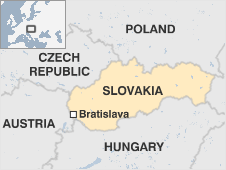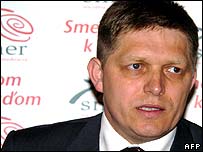Generic Medicines
Taj Pharma is the largest generic pharmaceutical company in India. We hold top positions in different established markets worldwide generics markets..
Right at the heart of Europe and with a history intertwined with that of its neighbours Slovakia has proudly preserved its own language and distinct cultural traditions.
 |
It was part of Czechoslovakia until the "velvet divorce" in January 1993. The subsequent independence years can be divided into several chapters.
The story in chapter one revolved around frosty relations with the European Union and Nato combined with rejection of economic reform.
Chapter two saw a complete change of direction and moves to embrace all three culminating in EU and Nato membership in 2004.
For the first five years after independence there was growing international criticism of the lack of respect for minority rights and the democratic process shown by the authoritarian prime minister Vladimir Meciar.
He led a string of coalition governments pursuing nationalist and populist policies until October 1998 when an alliance of liberals centrists left-wingers and ethnic Hungarians ousted him forming a new coalition with Mikulas Dzurinda as prime minister.
Under Mr Dzurinda Slovakia forged ahead with an economic reform programme and saw a boost in foreign investment. His government also tried to improve the lot of minorities.
Slovakia's ethnic Hungarian community seeks greater educational and cultural autonomy. The country has a significant Romany population who suffer disproportionately high levels of poverty and social deprivation.
The post-war Benes decrees which called for the expulsion of 3 million ethnic Germans and 600000 ethnic Hungarians from then-Czechoslovakia and the confiscation of their property remain a sensitive issue in relations with neighbours.
President: Ivan Gasparovic
Ivan Gasparovic defeated former Prime Minister Vladimir Meciar in the second round of the presidential elections in April 2004 on the eve of EU entry.
During his election campaign he supported EU accession but criticised the minority government's EU-oriented economic reforms.
In April 2009 Mr Gasparovic became the first president of Slovakia to win re-election when he defeated his centre-right challenger Iveta Radicova in the second round of voting by more than ten percentage points. He received more than 55% of the vote.
The president appoints the prime minister. However parliament exercises legislative power.
Prime minister: Robert Fico
The left-wing Smer Party led by Robert Fico won nearly 30% of the votes but not enough seats to govern alone at general elections in June 2006.
 Robert Fico has put social welfare at the top of his agenda
|
The president appointed Mr Fico prime minister after he reached a coalition agreement with the centre-left Movement for a Democratic Slovakia (HZDS) led by Vladimir Meciar and the right-wing Slovak National Party. The three parties together have 85 seats in the 150 seat parliament.
The new government replaced the centre-right coalition led by Mikulas Dzurinda. During his eight years as prime minister Mr Dzurinda steered through an economic reform package which won praise from international organisations but was far less popular with the voters. He also oversaw EU and Nato entry.
Mr Fico has said that his main priority was to strengthen social welfare measures reversing some of the policies of the previous government. Analysts are watching closely to see what impact his policies will have on the 2009 target date for euro entry.
Mr Fico approved the withdrawal of Slovakia's troops in Iraq which numbered around 110 by the end of 2007. He had described the invasion of Iraq as "unbelieveably unjust and wrong." Slovakia also has troops in Afghanistan.
Mr Fico was 41 when he became prime minister. He is a former human rights lawyer.
• The coalition came close to collapse in November 2007 over controversial land deals at an agency supervised by Mr Meciar's HZDS party.
Private network Markiza claims the lion's share of the TV audience. Cable and satellite TV are widely watched as are channels from the neighbouring Czech Republic and Hungary.
All major dailies are privately-owned and there are more than 20 private radio stations.
The constitution guarantees a free press. However a controversial provision in the 2008 Press Act which obliges newspapers to publish responses from individuals who say their reputation has been harmed by an article has been condemned by media rights bodies and journalists.
The Vienna-based International Press Institute warned in 2009 that the "targeting" of the press through defamation cases was causing alarm among journalists.
By May 2008 there were 2.7 million internet users (Internetworldstats).
The press
Television
Radio
News agency
TASR - partly state-funded
AFRICA | ASIA-PACIFIC | AMERICAS | EUROPE | MIDDLEEAST | SOUTHASIA
![]()
![]()
![]()
Mauritania Mauritius Morocco Mozambique Namibia Niger Nigeria Republic-of-congo Rwanda Sao-tome-and-principe Senegal Seychelles Sierra-leone Somalia South-africa Sudan Swaziland Tanzania The-gambia Togo Tunisia Uganda Australia Brunei Burma Cambodia China East-timor Fiji Indonesia Japan Kazakhstan Kiribati Kyrgyzstan Laos Malaysia Marshall-islands Micronesia Mongolia Nauru New-zealand North-korea Palau Papua-new-guinea Samoa Singapore Solomon-islands South-korea Taiwan Tajikistan Thailand The-philippines Tonga Turkmenistan Tuvalu Uzbekistan Vanuatu Vietnam Antigua-and-barbuda Belize Bolivia Brazil Canada Chile Colombia Costa-rica Cuba Dominica Dominican-republic Ecuador El-salvador Grenada Guatemala Guyana Haiti Honduras Jamaica Mexico Nicaragua St-kitts-and-nevis St-lucia Suriname Trinidad-and-tobago Uruguay Venezuela Albania Andorra Armenia Austria Azerbaijan Belarus Belgium Bosnia-hercegovina Bulgaria Croatia Cyprus Czech-republic Denmark Estonia Finland France Georgia Germany Greece Hungary Iceland Ireland Italy Latvia Liechtenstein Lithuania Luxembourg Macedonia Malta Moldova Monaco Montenegro Norway Poland Portugal Russia San-marino Serbia Slovakia Slovenia Spain Sweden Algeria Egypt Iran Iraq Israel-and-palestinian-territories Jordan Kuwait Lebanon Libya Mauritania Oman Saudi-arabia Sudan Syria Tunisia United-arab-emirates Yemen Afghanistan Bangladesh Bhutan India Nepal Pakistan Sri-Lanka The-Maldive